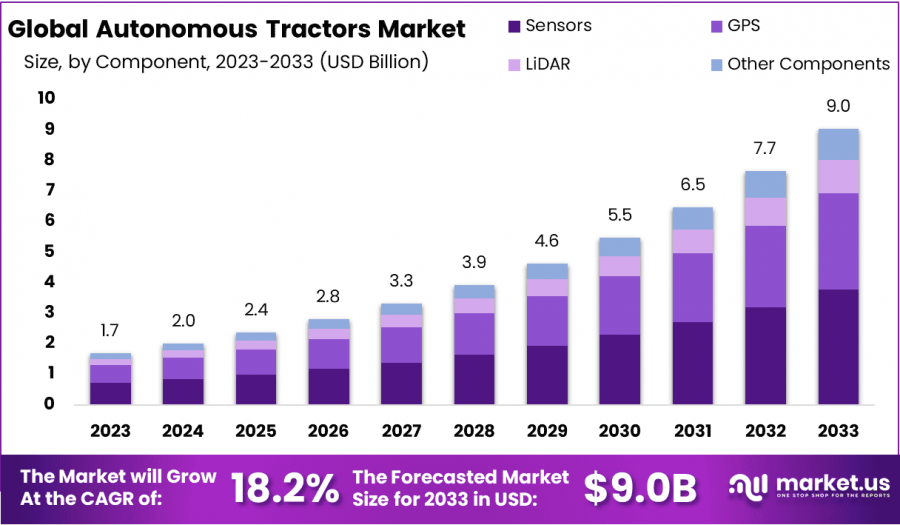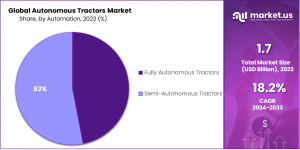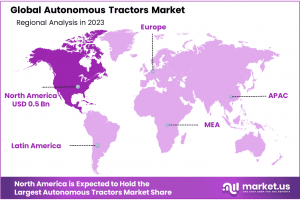
Autonomous Tractors Market to Reach USD 9 Billion by 2033, Growing at a CAGR of 18.20%
The Global Autonomous Tractors Market is projected to grow from USD 1.7B in 2023 to USD 9B by 2033, at a CAGR of 18.20% from 2024 to 2033.
NEW YORK, NY, UNITED STATES, January 24, 2025 /EINPresswire.com/ -- **Report Overview**
The Global Autonomous Tractors Market is projected to reach USD 9 Billion by 2033, growing from USD 1.7 Billion in 2023, at a CAGR of 18.20% from 2024 to 2033.
Autonomous tractors are self-driving agricultural machines designed to perform tasks such as plowing, planting, and harvesting without human intervention. These tractors utilize advanced technologies, including GPS, sensors, machine learning, and artificial intelligence, to navigate and perform agricultural operations autonomously. The primary goal of autonomous tractors is to increase efficiency, reduce labor costs, and optimize agricultural productivity.
The autonomous tractor market refers to the commercial landscape where these advanced farming solutions are being developed, manufactured, and adopted. This market includes companies that specialize in autonomous vehicle technology, agricultural machinery manufacturers, and startups focused on precision farming innovations. As the demand for more efficient and sustainable farming practices grows, the market for autonomous tractors is experiencing significant expansion.
Key growth factors driving the market include the increasing global demand for food, the labor shortage in agriculture, and advancements in autonomous vehicle technologies. Additionally, rising concerns about sustainability and the need to reduce carbon footprints are pushing the adoption of more efficient farming solutions.
The demand for autonomous tractors is accelerating as farmers look for ways to improve productivity while minimizing operational costs. Autonomous tractors can operate for longer hours without fatigue, thus improving field productivity and reducing dependence on seasonal labor.
Request Your Sample Report Today for In-Depth Insights and Analysis at https://market.us/report/autonomous-tractors-market/request-sample/
Opportunities in this market are vast, with the potential to transform global agricultural practices. As technology matures, we can expect more widespread adoption of autonomous tractors, particularly in regions with large-scale farms and a focus on agricultural efficiency.
**Key Takeaways**
~~ The Autonomous Tractors Market is set to grow significantly, with a projected increase from USD 1.7 billion in 2023 to USD 9.0 billion by 2033, representing a CAGR of 18.2%.
~~ North America holds the largest market share at 32%, driven by a strong agricultural sector and supportive regulatory frameworks.
~~ Sensors are the leading component in the market, capturing 41.7% of the share. This highlights their crucial role in enabling autonomous functions such as navigation, obstacle detection, and precision farming.
~~ Semi-autonomous tractors dominate the market, holding a 53% share, showing a trend towards more automated operations with human oversight.
~~ The tillage segment leads with 42% market share, driven by the adoption of autonomous tractors for tasks like plowing, planting, and soil cultivation.
~~ Tractors with power outputs exceeding 100 HP make up 49% of the market, reflecting the demand for high-performance machines capable of tackling large-scale farming tasks.
!!! Technological Innovations !!!
Leading agricultural technology companies are developing autonomous tractors with:
~~ Advanced GPS and mapping technologies
~~ Real-time data analysis capabilities
~~ Precision farming integration
~~ Reduced environmental impact
~~Enhanced operational efficiency
**Market Segmentation**
Sensors lead the market with a 41.7% share, playing a vital role in autonomous tractors by enabling precise navigation, environmental perception, and real-time data collection. Technologies like GPS, LiDAR, radar, and cameras provide crucial information about the tractor’s surroundings and operational conditions, enhancing safety, efficiency, and autonomy. These sensors are key to advancing and driving the adoption of autonomous tractor technology in agriculture.
The Semi-Autonomous Tractors segment leads the market with a 53% share, combining automation with human oversight. These tractors enhance productivity by incorporating automated steering, guidance systems, and precision farming technologies, while still allowing farmers to intervene when needed. This blend of efficiency, reduced labor demand, and flexibility makes semi-autonomous tractors a key driver of growth in agricultural automation.
The Tillage segment leads the market with a 42% share, focusing on soil cultivation activities like plowing and tilling. Autonomous tractors with advanced tillage features enhance precision, efficiency, and crop yields, revolutionizing traditional farming practices and boosting farm productivity.
The Above 100 HP segment leads the market with a 49% share, driven by demand for high-powered autonomous tractors. These tractors excel in heavy-duty tasks like plowing, planting, and harvesting on large farmlands, boosting productivity and efficiency in modern agriculture.
**Key Market Segments**
By Component
~~ Sensors
~~ GPS
~~ LiDAR
~~ Other Components
By Automation
~~ Fully Autonomous Tractors
~~ Semi-Autonomous Tractors
By Application
~~ Planting & Seeding
~~ Spraying & Fertilizing
~~ Tillage
~~ Other Applications
By Power Output
~~ Up to 30 HP
~~ 30 HP to 100 HP
~~ Above 100 HP
**Driving factors**
Increasing Demand for Precision Farming
The global shift toward precision farming is one of the primary drivers behind the growth of the autonomous tractors market in 2024. As farmers strive to optimize yields while minimizing costs, autonomous tractors offer an efficient solution by integrating advanced technologies such as GPS, AI, and IoT. These tractors can operate with a high degree of precision, reducing the use of resources like fuel, water, and fertilizers. By executing tasks like planting, tilling, and harvesting autonomously, they ensure consistent quality and performance, significantly boosting operational efficiency. Precision farming, coupled with data analytics, also provides insights into soil health and crop performance, fostering sustainable agricultural practices and improving long-term farm profitability.
"Order the Complete Report Today to Receive Up to 30% Off at https://market.us/purchase-report/?report_id=114576
**Restraining Factors**
High Initial Investment Costs
A significant restraint on the growth of the autonomous tractors market in 2024 is the high initial investment required for these advanced machines. Although autonomous tractors can provide long-term cost savings through improved efficiency, the upfront costs remain a barrier for many farmers, especially those operating in developing regions. These tractors are equipped with cutting-edge technology such as sensors, machine learning algorithms, and GPS systems, all of which drive up their prices. As a result, small to medium-sized farms may find it challenging to justify the investment, particularly in regions with less access to financing options or agricultural subsidies.
**Growth Opportunity**
Advancements in Artificial Intelligence and Machine Learning
Advancements in artificial intelligence (AI) and machine learning (ML) present significant opportunities for the autonomous tractors market in 2024. AI and ML enable tractors to process large volumes of data in real-time, allowing them to make better decisions based on environmental conditions, soil health, and crop status. With AI-powered systems, these tractors can learn and adapt to changing field conditions, improving their precision and efficiency over time. This capability not only enhances the operational effectiveness of autonomous tractors but also leads to higher crop yields, greater resource efficiency, and more sustainable farming practices.
**Latest Trends**
Increasing Focus on Sustainability
In 2024, sustainability is a key trend influencing the growth of the autonomous tractors market. As concerns over climate change and environmental degradation intensify, farmers are seeking more sustainable agricultural practices. Autonomous tractors are increasingly viewed as a solution to achieving these goals. These machines are not only more efficient in terms of fuel and resource usage but also help reduce the carbon footprint of farming operations. By automating key tasks such as planting and harvesting, autonomous tractors reduce the need for manual labor and optimize resource allocation, contributing to reduced soil erosion, water waste, and pesticide use.
**Regional Analysis**
North America Leading with 32% Market Share in 2023
North America dominated the autonomous tractors market in 2023, holding a 32% share, valued at USD 0.5 billion. The region benefits from strong technological advancements, robust infrastructure, and increasing adoption of smart farming practices, driving the demand for autonomous tractors. Europe’s market is growing steadily, fueled by technological advancements and the adoption of precision farming. Countries like Germany and France are major players, with strong support for eco-friendly and energy-efficient agricultural machinery.
Asia Pacific is seeing rapid market expansion, led by countries like China and India, where the need for agricultural automation is driven by rising labor costs and food demand. The region is focused on improving farming efficiency through autonomous technologies. In Latin America, Brazil and Argentina are driving growth in the autonomous tractors market as they look to enhance agricultural productivity and reduce labor dependency through advanced technologies. The MEA region is adopting autonomous tractors at a slower pace, but the push for agricultural modernization and food security in countries like South Africa and Saudi Arabia is gradually boosting demand.
!! Request Your Sample PDF to Explore the Report Format !!
**Key Players Analysis**
In 2024, the Global Autonomous Tractors Market is set for significant growth, with key players driving technological advancements and innovation. Mahindra & Mahindra remains a strong contender, leveraging its robust agricultural portfolio and expanding automation solutions. Deere & Company is a market leader, focusing on precision farming through its advanced autonomous tractors and integrating AI and machine learning. Bear Flag Robotics, acquired by John Deere, is pushing the envelope with its autonomous retrofit systems, while Trimble Inc. continues to excel in GPS and IoT technology for autonomous machinery.
AG Leader Technology stands out for its software and automation solutions, providing key data-driven insights. Iseki & Co., Kubota Corporation, and CNH Industrial N.V. are investing heavily in robotics and precision farming to stay competitive. Meanwhile, AGCO Corporation, Autonomous Solutions, Inc., and Escorts Limited focus on providing high-performance solutions tailored to specific agricultural needs. Companies like Yanmar Holdings Co. and Agjunction are also making strides in enhancing autonomous tractor capabilities. With growing demand for automation in farming, these players are poised to capture significant market share in the coming years.
Top Key Players in the Market
~~ Mahindra & Mahindra
~~ Deere & Company
~~ Bear Flag Robotics
~~ Trimble Inc.
~~ AG Leader Technology, Inc.
~~ Iseki & Co., Ltd.
~~ Kubota Corporation
~~ CNH Industrial N.V.
~~ AGCO Corporation
~~ Autonomous Solutions, Inc.
~~ Escorts Limited
~~ Agjunction, Inc.
~~ Yanmar Holdings Co., Ltd.
~~ Autonomous Tractor Corporation
~~ Other Key Players
**Conclusion**
The Global Autonomous Tractors Market is set to grow significantly, reaching USD 9 billion by 2033. Driven by the demand for precision farming, labor efficiency, and sustainable practices, autonomous tractors are transforming agriculture. While high upfront costs remain a challenge, advancements in AI and machine learning offer major growth opportunities. North America leads the market, but rapid adoption is also occurring in Asia Pacific and Latin America. With key players innovating and expanding, the future of autonomous tractors in agriculture looks promising.
Lawrence John
Prudour
+91 91308 55334
email us here
Visit us on social media:
Facebook
LinkedIn
Distribution channels: Automotive Industry
Legal Disclaimer:
EIN Presswire provides this news content "as is" without warranty of any kind. We do not accept any responsibility or liability for the accuracy, content, images, videos, licenses, completeness, legality, or reliability of the information contained in this article. If you have any complaints or copyright issues related to this article, kindly contact the author above.
Submit your press release


